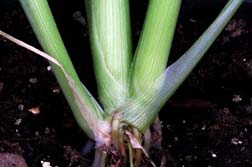OSU botany expert Doust awarded $3.2 million grant
Wednesday, August 13, 2014
Doust awarded $3.2 million NSF research grant

Dr. Andrew Doust, associate professor of botany at Oklahoma State University, has been awarded a 4-year grant totaling $3.2 million to study the genetic regulation of specialized branches in grasses, known as “tillers.” Tillers play important roles in grain yield and biomass accumulation that are factors in developing better biofuels and perennial grain crops. However, little is known about most of the genes that contribute to their initiation and growth.
“Tillering is of great interest because it is both genetically regulated and exquisitely sensitive to environmental conditions,” Doust said. “Part of the domestication process is to desensitize the plant to environmental cues to allow us to grow crop plants very close together. Understanding how grasses (and other plants) branch is to understand the central objective of a plant, how to control the space around it. Control of tillering allows a grass to respond to environmental cues and to preferentially move energy for more vegetative growth by increasing branching, or more grain production by decreasing branching.”
This project exploits the evolutionary variation and changes that took place during domestication in maize, sorghum and foxtail millet, three cereals in the panicoid subfamily of grasses, explained Doust. Analysis in both ancestral and domesticated genetic backgrounds will provide insight into the gene networks necessary for growth and development of tillers in these grasses, which should facilitate the development of better biofuel and perennial grain crops.
As part of the grant project, Doust will also be working closely with Dr. Julie Angle, OSU assistant professor and coordinator of the secondary science education program, to integrate high school science teachers into a research environment during the summers. The research, combined with professional development activities, will help educators gain a deeper understanding of how scientific knowledge is generated and assist them with curriculum development.
Funded by the National Science Foundation’s Plant Genome Research Program (PGRP), this project also includes researchers at Brigham Young University, West Virginia University, and the Plant Gene Expression Center in Berkeley, California.
The PGRP is under NSF’s Directorate for Biological Sciences. The program began as part of the National Plant Genome Initiative (NPGI), an interagency working group coordinated by the National Science and Technology Council. The goals of the PGRP are to support basic research to address fundamental questions in plant biology at the genome-wide scale; and to build genomic resources, tools, and technologies to be made available to other researchers to enable future discoveries in basic and applied sciences to address societal issues related to agriculture and the environment.
